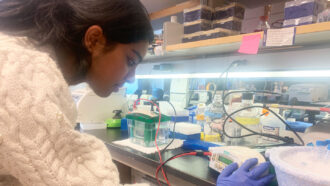Gut germs to the rescue
Many of the bacteria that live in our intestines may help keep us healthy.
By Emily Sohn
In many situations, bacteria are bad guys. As soon as your defenses are down, the tiny microbes infect your body and make you sick.
Germs can also be good for you, researchers are discovering. Between 500 and 1,000 different kinds of microbes live in a person’s intestines. There are, in fact, more bacteria in your gut than cells in your entire body. Many of them may help keep us healthy.

The wonders of gut microbes don’t stop there. B. thetaiotaomicron also seems to regulate specific genes in the gut and helps the intestines work better by sparking the growth of blood vessels. This “good” bacterium even stimulates the production of a chemical that kills other kinds of “bad,” disease-causing bacteria.
To study how bacteria cause disease, scientists have created mice that have no germs at all. These animals end up needing to eat much more than do normal rodents, and they are much more likely to get sick.
By introducing just B. thetaiotaomicron into germfree mice, researchers can find out what changes these particular bacteria cause. These changes include altering which sugars the intestine makes and keeping gut bacteria from sneaking into other parts of the body.
As more details emerge about how important gut bacteria are to our health, you might want to add a Bacteria Appreciation Day to your date-book.







